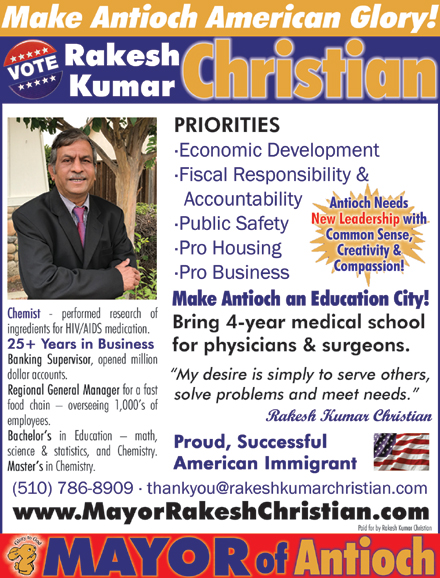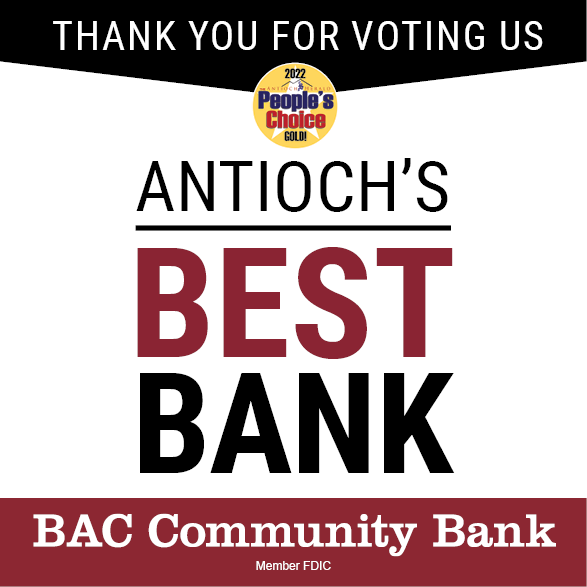Public outcry defeats proposal for majority vote to place items on Antioch Council agenda
Council members respond by proposing items for future meeting agendas
By John Crowder
At the February 10, 2015, meeting of the Antioch City Council, outrage from local residents over City Manager Steve Duran’s proposal to prevent council members from placing items on future agendas without a majority of the council members voting to do so resulted in the abandonment of the practice. Instead, a motion by recently elected Mayor Pro Tem Lori Ogorchock that allows every council member to see their ideas placed on a future agenda passed on a 5-0 vote.
The procedure being used to place items on the agenda during city council meetings came under scrutiny following their January 13 meeting. During council comments at that meeting, Ogorchock noted that over $400,000 in Measure O funds were available because increased property tax revenue had allowed for the return of city staff to a 40-hour work week. She then asked that an item be placed on the agenda to discuss the hiring of additional Community Service Officers (CSO’s). However, Duran and Mayor Wade Harper told her she was not able to place items on the agenda without a consensus of the council (see article, Antioch Council Meeting: Of Card Rooms, Cats And Community Service Officers, here).
Following the meeting, a series of editorials in the Antioch Herald shined a spotlight on the practice, apparently implemented under Harper, to not place suggested items on future agendas unless at least three council members, “nodded in consent.” Herald publisher Allen Payton, who had served on the city council in the late 1990’s, soundly criticized the practice (see Payton Perspective columns of January 27th, February 6th and 11th). His criticism was shared by Antioch residents posting comments to his columns, on-line.
With criticism rapidly mounting, Duran commissioned city staff to conduct a survey of the method used by other cites and agencies in Contra Costa County. This survey was to lend support to an item he and Harper agreed to place on the agenda at the February 10 council meeting requiring a majority vote to have an item placed on future city council agendas. This set the stage for the confrontation over the issue at the February 10 meeting.
When the agenda item, the last of the night, was reached, Duran began a lengthy defense of the idea, stating that, “there’s a lot of misunderstanding bantering about over the Internet waves regarding what this council has been doing in terms of how council members place things on the agenda. The practice since I’ve been here, and from what my staff tells me from long before, is the practice has been at a council meeting any council member can propose to have an item placed on a future agenda, and by consensus, or if there is no consensus, then a vote of the majority of the council would place that on a future agenda.”
Calling the idea that his proposal was not the usual manner of conducting business, “ludicrous,” Duran then discussed how the survey he had directed staff member Michelle Fitzer, Administrative Services Director, to undertake supported the staff recommendation of requiring a vote.
“In the vast majority of cases a majority vote of the council [is required] to place something on the agenda,” he said. “So, I just wanted to set the record as to what the facts are…”
Council members were then asked by Harper to pose questions to staff, and Ogorchock pointedly asked City Attorney Lynn Tracy Nerland, “A consensus nod, is that a valid vote?” Nerland responded by saying, “I think what you’re hearing from the city manager is since the question been raised that, then perhaps to ensure that there’s no misunderstanding that a vote might be the best approach in the future.”
Public comments followed, and it quickly became apparent that public sentiment was overwhelmingly opposed to Duran’s proposal. City Clerk Arne Simonsen referred the mayor and council members to a stack of fifteen emails that had been received regarding the item. Every one of them was opposed to the majority vote proposal.
In the emails, Mary Fletcher called the idea “not only unfair, but unethical.” Lee Ballesteros said that, “It will remove the representative aspect of our council members.” Ralph Garrow, Jr., said, “I strongly recommend that you abandon this ill-conceived attempt to quash possibly dissenting viewpoints,” and, “This proposal smacks of repressive government.” Joe Ramus suggested the proposal might be, “a violation of the Brown Act [open meeting law].” The remainder of the emails expressed similar views.
Several Antioch residents rose to speak on the matter. All were opposed to Duran’s proposal. Don Bright gave one of the most impassioned statements.
“As a veteran, I have a strong sense of loyalty to the ideals of democracy and our representative form of government,” he said. “In my view it is an affront to our freedom of speech as each council member is a representative of the people.”
He went on to call the proposal, “a thinly veiled effort to silence the voices of the citizenry.”
Other speakers included George Briggs, who said that two previous mayors had said a majority had never been required to put an item on the agenda. Fred Hoskins, calling Ogorchock, “a breath of fresh air in this city,” said the staff report in support of the proposal was, “gibberish.” He went on to say that all council members were empowered to put an item on the agenda.
“The bottom line is this. None of you up there should have less power as an individual elected representative than any one staff member,” Payton stated. “For 28 years, prior to this mayor being elected mayor, the practice has always been any council member can have any agenda item placed on the agenda.”
Julie Young said, “This is not representative government. Each of you was elected to represent the people. This is what our Constitution provides…a representative government.”
With public comments concluded, the council members weighed in on the matter. Council Member Tony Tiscareno said that any council member should have the right to put an item on the agenda as long as they didn’t “go rogue.” Council Member Mary Rocha said, “I believe we all have the right to put something on the agenda.” She said, “We don’t want to stifle anybody.” Council Member Monica Wilson said, “I don’t support the three votes, it seems that it kind of stifles our community.”
Ogorchock, referencing Duran’s proposal, gave a strongly-worded statement in opposition to the idea.
“If we, as a council consider adopting this change we will not be able to judiciously add to the agenda for our constituents in a timely manner. We will have given up our rights and our privileges to participate and function as a governing board. I would be forfeiting my right to speak out for our constituents, with their concerns and ideas, but instead must now vie for votes just to add the items to the agenda.”
Ogorchock continued, “Do we as a city truly want to block what our constituents and elected council members want on an agenda, and thus available for open discussion and public review? I think not. Any individual council member should not have less power and authority than a member of the city staff. If staff can place any item on the agenda, so should we as council members.”
Directly addressing the survey undertaken by Fitzer, Ogorchock said, “I believe we should be the leaders for our neighboring cities, and not followers on how they may, or may not, be running their meetings.”
Harper then commented, and after an exchange with Duran, said, “I want to apologize to Lori [Ogorchock] if I made you feel like I didn’t want you to be heard. That is not the intent. It doesn’t matter if I agree or not, that is not the point.”
“I think we work well together as a council when we hear all the ideas,” he added.
Following other comments by council members, Ogorchock, noting that, “a consensus nod is not a vote,” made a motion to allow each council member to have the power to place any item on a future council agenda. The mayor and city manager would then need to place the item on an upcoming agenda within six months. The motion was seconded by Rocha. The motion passed on a 5-0 vote. It also included adding language of “Future Agenda Items” to the Council Communications agenda item.
As the meeting drew to a close, the effects of the vote became readily apparent, as four of the council members directed that staff place specific items on future agendas. Rocha, in making a request that a presentation by the Rivertown group that has been advocating for a downtown event center for several months be placed on the agenda, said she was, “Using the new method that was just decided.”
Ogorchock, returning to the item that she had originally proposed on January 13, 2015, said that she wanted the hiring of additional CSO’s placed on the agenda. Wilson asked that the discussion of a youth commission and another item involving the use of solar power be added to future agendas. Harper said he wanted to look into changing the name of L Street to Marina Boulevard.
The entire city council meeting can be viewed online at the city website, www.ci.antioch.ca.us/CityGov/citycouncilmeetings.htm. The next meeting of the Antioch City Council is scheduled for Tuesday, February 24 at 7:00 p.m.



























At the meeting they decided to drop the minimum time period to place an item on an upcoming agenda, because they said it could be placed sooner than the three months.
Thank you John. One thing I always like about your articles is there is enough detail of the back story you get the whole picture.